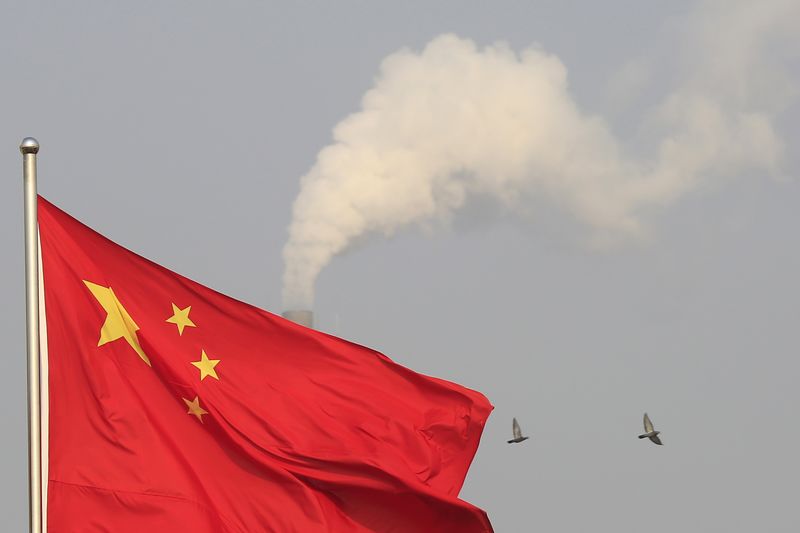(Bloomberg) -- China has embraced the idea of defaults imposing some discipline on debtors in its bond market. And some of the most troubled debtors are local governments’ financing vehicles. So an LGFV default has long seemed on the cards. But it just isn’t happening.
Moody’s Investors Service thought the first one might come in 2017. Almost two years later, there have been some close calls -- including with a late payment by a unit owned by Qinghai province on a dollar bond last month that caused ripples through the investment community -- but no default.
What it suggests is China’s leadership isn’t prepared for a borrower with a regional authority’s imprimatur to renege on its principal, triggering higher borrowing costs across a swathe of the world’s third-largest bond market. Stepping in with official assistance when needed will help local authorities sustain the development spending key to holding up national growth. The cost may be an even bigger future reckoning with bad debt.
“In the longer run, someone has to pay eventually for this so-called ‘kick the can down the road’ plan -- taxpayers and depositors perhaps,” said Desmond How, head of fixed income, GaoTeng Global Asset Management. Regulators may need to reverse some policies, giving LGFVs greater rein to borrow to help support economic growth, How said.
Finance Minister Liu Kun said over the weekend that accelerated debt sales will help to boost domestic demand, underlining the importance of bonds as a stimulus tool.
For investors willing to stomach the occasional late payment, the implicit backing for LGFVs offers some yield pick-up. Luo Xianzhi, fund manager at Shanghai Tianzeng Investment Management Co., says he’s sitting on a 9 percent annualized return since he started stocking up on local securities last November.
“The LGFV bonds issued for land development, infrastructure construction and shantytown rebuilding indeed have implicit government support” that’s unlikely to disappear given their importance for growth, said Shanghai-based Luo. “I think there never will be big-scale defaults from this sector.”
If so, that makes a contrast with other securities in China, where borrowers are reneging on bond payments at a record pace. Defaults were logged on 119.6 billion yuan ($17.8 billion) of domestic debt last year, and payments were missed on another 15 billion yuan of notes in the first two months of 2019, according to data compiled by Bloomberg. Most of those have stemmed from privately owned enterprises, but there have been some state companies too.
Chinese policy makers have had a Hamlet-like approach toward LGFVs over the past decade. They came to prominence when the previous generation of national leaders unleashed a record credit boom in the midst of the global financial crisis. Reluctant to run up the central government’s debt, Beijing let local authorities set up units to fund all manner of spending.
The lack of control later spooked national regulators, who agonized over a massive build-up of bad debt. Yet the vital role LGFVs continue to play in supporting development means a get-tough approach carries risks as well. That helps explain the pattern of regulatory changes over the years.
For its part, Moody’s still warns a first default is looming. Ivan Chung, head of greater China credit research at the agency in Hong Kong, highlights a December statement by regulators calling on local officials to dispose of zombie borrowers. Given more than 2,000 LGFV bond issuers, it’s unlikely that existing support channels will be sufficient to cover all troubled borrowers, he said. “I expect isolated default cases to happen in the next two-to-three years.”
Regulators have lately been offering support, including relaxing bond issuance rules and letting the state-directed China Development Bank lead local government debt restructuring plans in pilot cities.
“It shows that local governments don’t have enough money for the debt repayments unless the central authorities step in to support them -- otherwise many of the LGFVs would go into default,” said Hao Hong, chief strategist at Bocom International Holdings Co. Support is likely to expand as LGFV debt maturities swell, he said.
With 3.6 trillion yuan coming due from April 1 through the end of 2021, according to data compiled by Bloomberg, the readiness to help will assuredly be tested.
(Adds reference to government plans for bond sales in fifth paragraph.)
To contact Bloomberg News staff for this story: Carrie Hong in Hong Kong at chong61@bloomberg.net;Yuling Yang in Beijing at yyang329@bloomberg.net;Qingqi She in Shanghai at qshe@bloomberg.net
To contact the editors responsible for this story: Neha D'silva at ndsilva1@bloomberg.net, Christopher Anstey, Lianting Tu
©2019 Bloomberg L.P.
